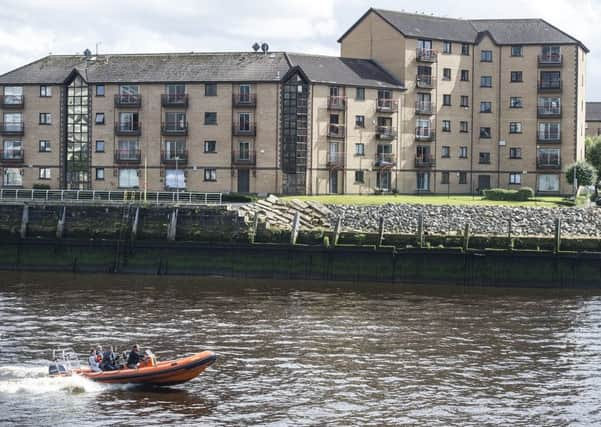Fears Clyde's banks collapsing as water drops to lowest in 60 years


One of three gates on the weir suffered a mechanical fault causing it to jam open on Tuesday morning.
This resulted in water levels to the east of the structure falling at low tide rather than being kept at a steady level.
Advertisement
Hide AdAdvertisement
Hide AdA rescue worker said it was the lowest he had seen in 65 years of working on one of Scotland’s most well-known rivers.
READ MORE: {http://www.scotsman.com/regions/glasgow-strathclyde/historic-ts-queen-mary-finds-permanent-home-on-the-clyde-1-4543954| Historic TS Queen Mary finds permanent home on the Clyde
Glasgow City Council have said that the reduced water pressure on the banks of the river risked them becoming unstable.
A number of boats were left lying on their sides in shallow water, canoeists were ordered out of the river and people were asked to keep off the riverside walkway.
Cracks were seen in the riverbank in a number of locations and the walkway at Adelphi Street in Glasgow was closed as a precaution.
The tidal weir is used to ensure the upper Clyde, east of the Albert Bridge, is kept at a constant depth.
Without the weir, the upper channel would rise and fall with the tide from a depth of more than four metres to only 1.5m.
Outward pressure from the higher depth of water is one of the factors which ensures the river banks are stable.
Advertisement
Hide AdAdvertisement
Hide AdThe falling water level creates a risk the banks will become unstable or even start to move.
The city council set up a multi agency group including the police, fire brigade and the Scottish Environmental Protection Agency, to manage the situation.
A council spokesman said: “Water levels east of the weir are unusually low which could potentially affect the stability of some stretches of the riverbank.
“We are advising people to stay off the riverbank east of the weir, not because there is evidence of any danger but because there is a potential for danger.”
George Parsonage, chief officer of the Glasgow Humane Society, ordered rowers off the river and was on site as attempts were being made to get the gate back in place.
He said: “There are definitely cracks in the riverwall at Adelphi Street and Waterside Street and there has been movement further up the river.”
It is hoped water levels returning to normal will stabilise the sections of river wall which have been affected by the failure of the weir gate.
A SEPA spokesman said: “We can confirm that no flooding impacts are currently forecast or anticipated as a result of this issue, however, we will continue to monitor the situation.”